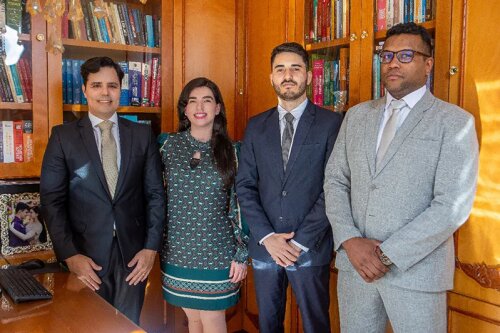Best Public-Private Partnerships (PPP) Lawyers in Goiânia
Share your needs with us, get contacted by law firms.
Free. Takes 2 min.
List of the best lawyers in Goiânia, Brazil
About Public-Private Partnerships (PPP) Law in Goiânia, Brazil
Public-Private Partnerships, widely known as PPPs, are collaborative agreements between government entities and private sector companies. In Goiânia, Brazil, PPPs have become a popular mechanism for delivering public infrastructure and services such as transportation, sanitation, education facilities, healthcare, and urban mobility solutions. The main purpose of a PPP is to leverage private sector expertise, technology, and investment to achieve public objectives more efficiently and effectively than the government might accomplish alone. Brazilian federal law, along with state and municipal regulations, governs the formations, obligations, and execution of PPP agreements, ensuring public interest and transparency.
Why You May Need a Lawyer
Engaging in a Public-Private Partnership involves complex legal, financial, and regulatory frameworks. You may need legal assistance for several common reasons:
- Assessing the feasibility and structuring of a PPP project
- Reviewing, drafting, or negotiating PPP contracts and supporting documents
- Ensuring compliance with local, state, and federal PPP regulations
- Participating in public tenders and understanding bidding requirements
- Resolving disputes between public authorities and private partners
- Navigating project financing, risk allocation, and guarantees
- Understanding public sector partnership obligations and deadlines
- Evaluating rights and obligations upon project termination or transfer
A lawyer with expertise in PPPs can protect your interests, avoid costly mistakes, and facilitate the complexities involved in such partnerships.
Local Laws Overview
The legal structure of Public-Private Partnerships in Goiânia is influenced by Brazilian federal law (Law No. 11.079/2004) as well as specific state and municipal legislation. The main principles include transparency, competition, financial equilibrium, and long-term sustainability. Goiânia’s municipal regulations set out additional criteria for selection, contract execution, and project management of PPPs in the city, often handled by the Secretaria Municipal de Governo (SEGOV).
Key aspects of local PPP law in Goiânia:
- Pipelines for project selection often require a public interest statement and feasibility study
- Projects must be included in the Municipal PPP Program and comply with budgetary restrictions
- Public calls for tenders are mandatory, ensuring equal opportunity for private entities
- Risk allocation between parties must be clear and follow legal standards
- Contracts can span up to 35 years, depending on project nature
- Payment mechanisms, guarantees, and dispute resolution procedures are set by contract, within legal parameters
- Monitoring and performance evaluation are compulsory elements of PPP contracts
Frequently Asked Questions
What is a Public-Private Partnership (PPP)?
A PPP is a legally binding collaboration between a government body and a private company to deliver public infrastructure or services, typically sharing investment, risks, and rewards.
What types of projects can be developed through PPPs in Goiânia?
PPPs can be used for transportation, water and sanitation systems, energy, public lighting, education, health, security, and urban infrastructure projects.
How are PPPs regulated in Goiânia?
PPPs in Goiânia follow Brazilian federal legislation (Law No. 11.079/2004), relevant state laws, and specific municipal norms, under the supervision of the City Hall and agencies like SEGOV.
Who can participate in PPPs in Goiânia?
Qualified private companies and consortia, national or international, can participate in PPP tenders, provided they meet legal, technical, and financial requirements outlined in each public notice.
What is the process for initiating a PPP project in Goiânia?
The process typically starts with a feasibility study and public interest statement, followed by publication of the opportunity, competitive bidding, contract award, and performance monitoring.
How can disputes in PPPs be resolved?
Dispute resolution mechanisms are usually defined in the contract and may include mediation, arbitration, or recourse to judicial courts, depending on the nature of the disagreement.
What are the main risks in PPP contracts?
Main risks involve financial imbalances, construction delays, demand shortfalls, regulatory changes, and performance failures. These risks are allocated contractually between the parties.
Are PPP contracts subject to public transparency?
Yes, PPP agreements and performance reports are generally public records, and transparency is mandated by law to ensure accountability and protect public interest.
What are typical contract durations for PPPs in Goiânia?
Contracts usually last from 5 to 35 years, depending on the project complexity and required investment.
Why should I consult a lawyer before engaging in a PPP?
A specialized lawyer can help identify legal risks, draft and review contracts, ensure compliance, advise on bidding processes, and represent your interests in negotiations or disputes.
Additional Resources
When seeking further information or assistance concerning PPPs in Goiânia, the following resources may be useful:
- Goiânia Municipal Government (Prefeitura de Goiânia), especially Secretaria Municipal de Governo (SEGOV)
- Brazilian Development Bank (BNDES) PPP support programs
- Brazilian Association of Infrastructure and Basic Industries (Abdib)
- Specialized law firms with practice in infrastructure projects and administrative law
- Official municipal publications and the Diário Oficial do Município de Goiânia for public notices and bidding processes
- Brazilian Ministry of Economy’s PPP Unit for guidelines and technical assistance
Next Steps
If you are considering involvement in a PPP project in Goiânia, it is essential to seek professional legal advice. Here is how to proceed:
- Collect relevant documents and information about the intended PPP project
- Identify a law firm or independent lawyer specializing in PPPs and public law
- Schedule an initial consultation to discuss your goals and any specific questions
- Request an analysis of legal risks, opportunities, and compliance obligations
- Rely on your lawyer to review or draft contracts, participate in tenders, and represent your interests in negotiations or legal proceedings
- Stay informed on changes to relevant legislation and best practices in PPPs
Working with a qualified legal expert can optimize your chances of success and help you avoid potential obstacles in the complex environment of Public-Private Partnerships in Goiânia.
Lawzana helps you find the best lawyers and law firms in Goiânia through a curated and pre-screened list of qualified legal professionals. Our platform offers rankings and detailed profiles of attorneys and law firms, allowing you to compare based on practice areas, including Public-Private Partnerships (PPP), experience, and client feedback.
Each profile includes a description of the firm's areas of practice, client reviews, team members and partners, year of establishment, spoken languages, office locations, contact information, social media presence, and any published articles or resources. Most firms on our platform speak English and are experienced in both local and international legal matters.
Get a quote from top-rated law firms in Goiânia, Brazil — quickly, securely, and without unnecessary hassle.
Disclaimer:
The information provided on this page is for general informational purposes only and does not constitute legal advice. While we strive to ensure the accuracy and relevance of the content, legal information may change over time, and interpretations of the law can vary. You should always consult with a qualified legal professional for advice specific to your situation.
We disclaim all liability for actions taken or not taken based on the content of this page. If you believe any information is incorrect or outdated, please contact us, and we will review and update it where appropriate.









